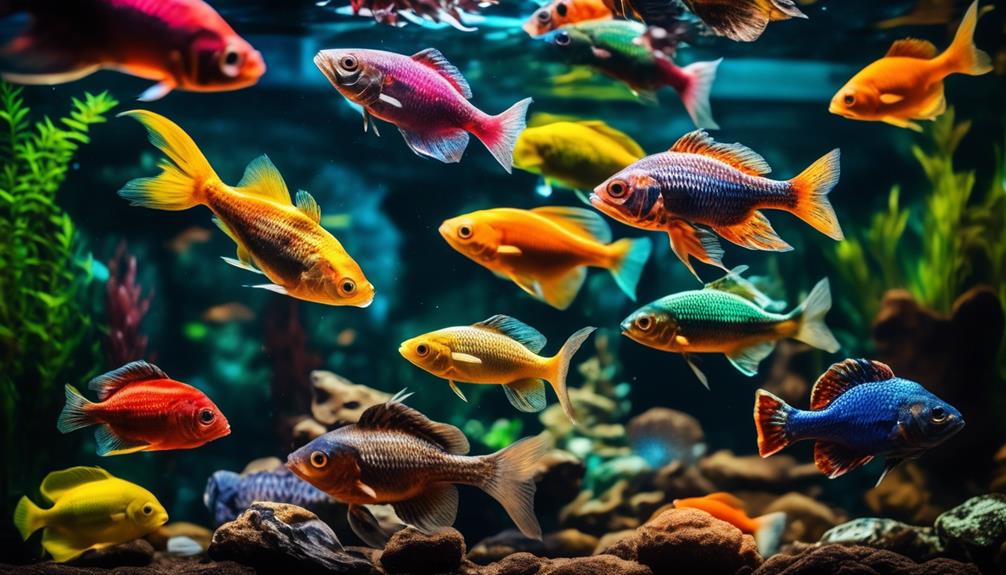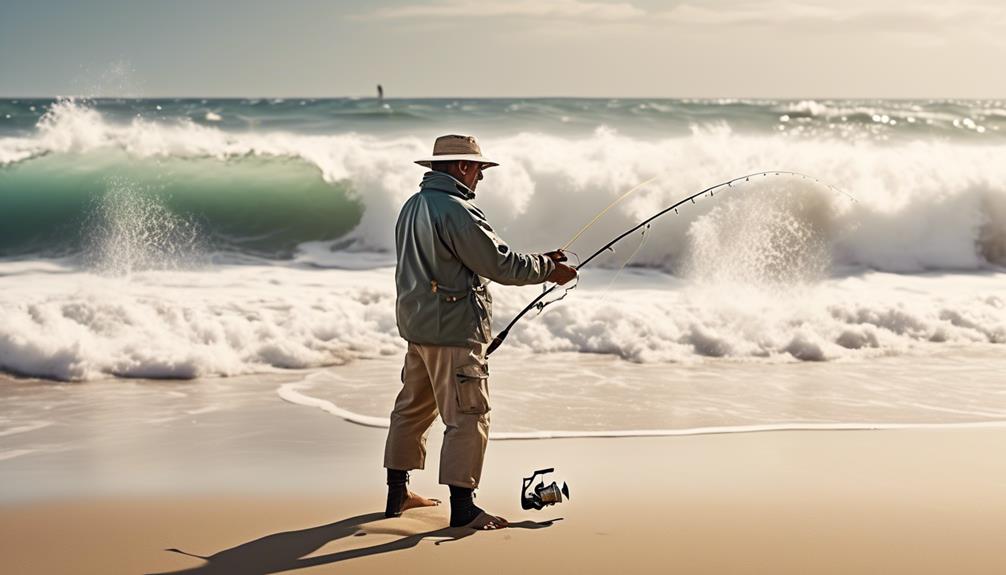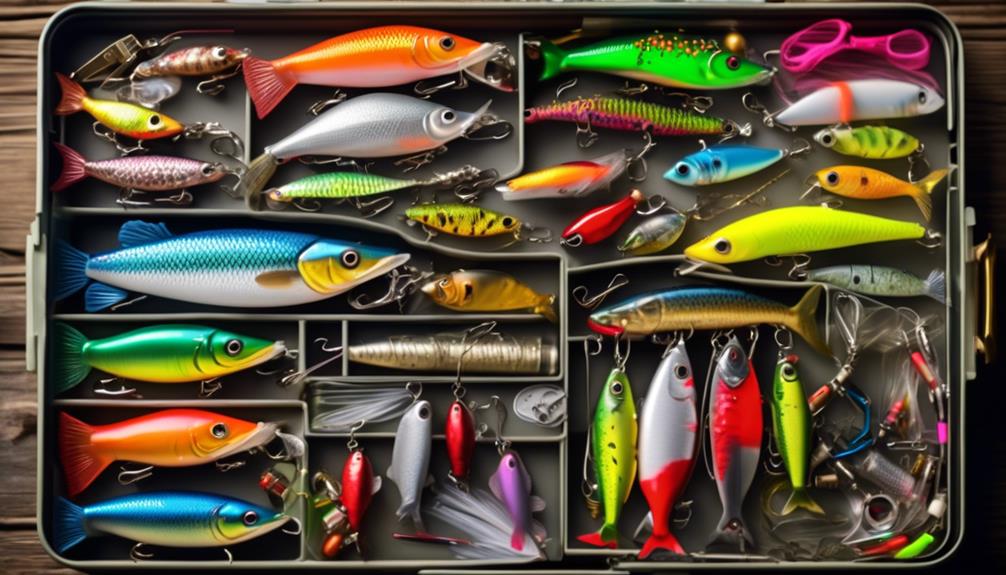When it comes to adding a new freshwater fish to your aquarium, the choice can seem overwhelming yet crucial. You want a fish that’s visually striking but also easy to care for.
But how do you find the perfect balance between aesthetic appeal and manageable maintenance? Well, by following these seven essential tips, you can ensure that the freshwater fish you choose not only enhances the beauty of your tank but also thrives in its new environment.
Consider the Fish’s Size
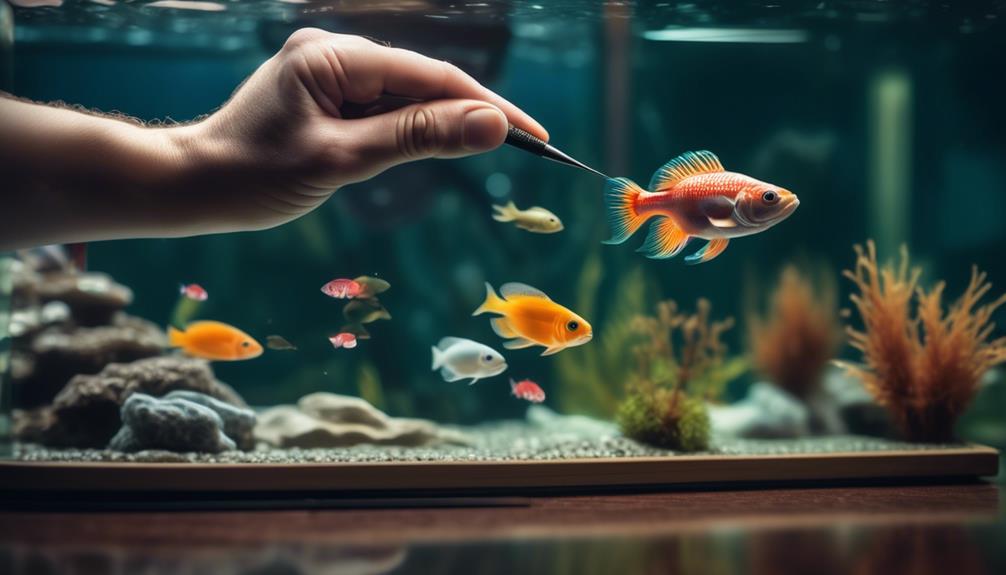
When selecting freshwater fish, consider the size of the fish to ensure it will thrive in your aquarium environment. It’s essential to choose fish that are suitable for the size of your tank. Smaller tanks are better suited for smaller fish, such as neon tetras or guppies, while larger tanks can accommodate bigger fish like angelfish or gouramis. Keep in mind that some fish may start out small but can grow quite large, so research the adult size of the fish before making your selection.
The size of the fish also affects their behavior and compatibility with other fish. Larger fish may be more aggressive and territorial, so it’s crucial to choose fish that will coexist peacefully. Additionally, some species of fish require more space to swim and explore, so a larger tank is necessary for their well-being. On the other hand, smaller fish may feel stressed and vulnerable in a large tank with larger, more active fish.
Consider the size of your tank when deciding on the number of fish to introduce. Overcrowding can lead to poor water quality and stress for the fish. A general rule of thumb is to allow one gallon of water per inch of fish, but this can vary depending on the specific needs of the fish species.
Assess the Fish’s Temperament
Considering the size of the fish in relation to your tank, it’s important to also assess the temperament of the fish you’re considering adding to your aquarium. The temperament of a fish can greatly affect the dynamics within your tank and the overall well-being of your aquatic community.
Here are some key points to consider when evaluating the temperament of freshwater fish:
- Aggressiveness: Some fish species are known to be aggressive and territorial, often leading to conflicts with other tank mates. It’s essential to research the aggressiveness of a fish before introducing it to your tank, especially if you have peaceful or timid species already residing in the aquarium.
- Compatibility: Certain fish species have specific social or environmental needs. It’s crucial to choose fish that are compatible with each other in terms of behavior and habitat preferences. For instance, some fish thrive in schools, while others prefer solitude. Understanding these requirements is vital for maintaining a harmonious tank environment.
- Feeding Behavior: The feeding habits of fish can vary widely. Some species are voracious eaters and may outcompete or even prey on other tank inhabitants during feeding time. Conversely, there are also fish that are shy or slow eaters, requiring special consideration to ensure they receive adequate nutrition.
- Territoriality: Many freshwater fish exhibit territorial behavior, especially during breeding or when establishing dominance. Understanding the territorial nature of a fish species is important for preventing aggression and ensuring that all tank occupants have sufficient space and resources.
Examine the Fish’s Care Requirements
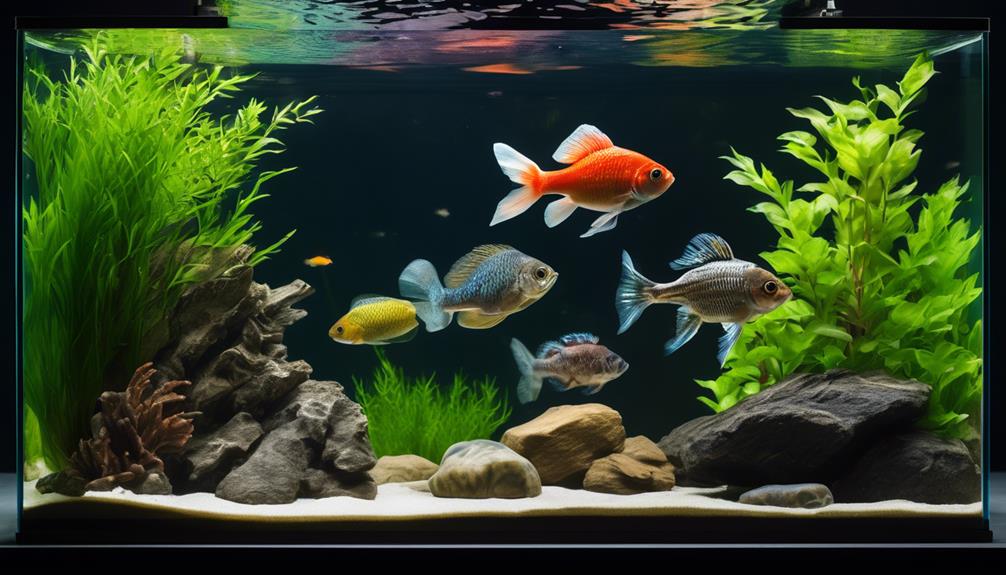
To ensure the well-being of your freshwater fish, it’s essential to carefully examine their specific care requirements before adding them to your aquarium. Different fish species have varying needs when it comes to water temperature, pH levels, diet, tank size, and companionship. Understanding these factors will help you create a suitable environment for your fish to thrive.
Start by researching the optimal water conditions for the fish you’re interested in. Some species, like goldfish, prefer cooler water, while others, such as tropical fish, require warmer temperatures. It’s crucial to maintain stable water parameters to prevent stress and illness in your fish.
Consider the dietary preferences of the fish. Some are herbivores, others are carnivores, and some are omnivores. Ensure you can provide the appropriate food for your chosen species to keep them healthy and vibrant.
Tank size is another critical factor. Larger fish need more space to swim and explore, while smaller fish may feel overwhelmed in a large tank. Research the adult size of the fish you want and plan your tank accordingly.
Lastly, think about suitable tank mates. Some fish are peaceful, while others can be aggressive or territorial. Make sure the fish you choose can coexist peacefully with others in your aquarium.
Evaluate the Fish’s Compatibility
Examine the Fish’s Care Requirements and then assess the compatibility of the fish you’re interested in adding to your aquarium to ensure a harmonious environment for all occupants. Compatibility is crucial when selecting freshwater fish for your aquarium. Here are some key factors to consider when evaluating the compatibility of freshwater fish:
- Behavioral Compatibility: Consider the behavior of the fish species you’re interested in. Some fish are aggressive and territorial, while others are peaceful and prefer to school. It’s important to choose fish that exhibit compatible behaviors to prevent aggression and stress within the aquarium.
- Size Compatibility: Take into account the adult size of the fish you intend to keep. Mixing fish of significantly different sizes can lead to predatory behavior, with larger fish preying on smaller ones. Ensure that the fish you choose have similar size requirements to avoid potential conflicts.
- Water Parameter Compatibility: Different fish species have varying requirements for water temperature, pH levels, and hardness. It’s essential to select fish that share similar water parameter needs to create a suitable environment for all inhabitants.
- Dietary Compatibility: Evaluate the dietary needs of the fish you plan to introduce. Some fish are herbivores, while others are carnivores or omnivores. Ensuring that the fish in your aquarium have compatible dietary requirements will help prevent competition for food and malnutrition.
Considering these compatibility factors will help you create a thriving and balanced freshwater aquarium environment for your fish.
Research the Fish’s Diet

Start by investigating the dietary preferences and requirements of the freshwater fish species you’re interested in adding to your aquarium. Different fish species have varying dietary needs, and it’s crucial to ensure that you can provide the appropriate food for the specific species you intend to keep. Understanding the natural diet of the fish will help you ensure that you can meet their nutritional needs in a captive environment.
Some fish are herbivores, primarily feeding on plants and algae. Others are carnivores, requiring a diet rich in protein from sources like insects, small crustaceans, or other fish. There are also omnivorous species that consume a mix of plant and animal matter. Researching the dietary habits of the fish will guide you in selecting the right type of food, whether it’s flake, pellet, live, frozen, or freeze-dried food.
In addition to knowing the primary diet of the fish, it’s important to understand if they’ve any specific feeding behaviors. Some fish are surface feeders, while others feed in the middle or bottom of the tank. Knowing these behaviors will help you choose the right feeding techniques and ensure that all fish in the tank receive adequate nutrition.
Consider the long-term dietary needs of the fish as well. Some species have specific vitamin requirements or need a varied diet to thrive. Understanding these nutritional needs will contribute to the overall health and vitality of your aquarium inhabitants.
Look Into the Fish’s Lifespan
Understanding the dietary habits of the freshwater fish species you’re interested in will also lead you to consider their lifespan in your aquarium. The lifespan of a fish is an important factor to take into account when selecting the best freshwater fish for your aquarium.
Here are some key points to consider when looking into the fish’s lifespan:
- Longevity: Different freshwater fish species have varying lifespans. Some may live for just a few years, while others can survive for a decade or more. Knowing the expected lifespan of the fish you’re interested in will help you make an informed decision.
- Size Matters: In general, larger fish tend to live longer than smaller ones. Keep in mind the adult size of the fish you’re considering, as this can give you an indication of its potential lifespan.
- Species-Specific Factors: Certain species of freshwater fish are known to be more resilient and have longer lifespans in captivity. Researching the specific requirements and lifespan of the fish species you’re interested in is crucial for their well-being in your aquarium.
- Quality of Care: The lifespan of freshwater fish can be significantly impacted by the quality of care they receive. Factors such as water quality, diet, tank size, and compatible tank mates all play a role in determining the longevity of the fish in your aquarium.
Considering the lifespan of the freshwater fish you’re interested in will help ensure that you’re prepared to provide the necessary care for the duration of their lives.
Take Note of the Fish’s Availability

When selecting freshwater fish for your aquarium, consider the availability of the fish in your local pet stores or from reputable breeders. It’s important to choose fish that are readily available to ensure that you can easily find replacements or additions in the future. Some fish species may be more challenging to find, especially rare or exotic ones, and this could limit your options for expanding your aquarium later on. By opting for commonly available fish, you can safeguard against potential disappointment and ensure a wider selection for future purchases.
Checking the availability of the fish you’re interested in is crucial for creating a sustainable and thriving aquarium. Many popular species are bred in large numbers, making them consistently available at pet stores. On the other hand, some fish are only seasonally available or may have limited distribution, which could make them harder to obtain.
Researching the availability of freshwater fish in your local area is a practical step before making any purchases. Visiting different pet stores or contacting reputable breeders will give you an idea of the range of fish species you can easily access. Additionally, joining online aquarium communities or forums can provide insights into the availability of specific fish species in different regions.
Ultimately, considering the availability of freshwater fish is vital for the long-term success and enjoyment of your aquarium. By choosing readily available fish, you’ll have more flexibility in creating and maintaining your aquatic ecosystem.
Frequently Asked Questions
What Are Some Common Health Issues That Freshwater Fish May Experience and How Can They Be Prevented?
To prevent common health issues in freshwater fish, maintain good water quality, ensure a balanced diet, and quarantine new additions. Regularly clean the tank, monitor for signs of illness, and seek veterinary care if needed.
Are There Any Specific Tank Decorations or Plants That Are Recommended for Certain Freshwater Fish Species?
When choosing tank decorations or plants for your freshwater fish, consider their natural habitat. For example, cichlids from rocky environments may appreciate caves, while tetras from dense vegetation areas might prefer plants.
How Can I Tell if a Fish Is Stressed or Unhappy in Its Environment?
If your fish is stressed or unhappy, look for signs like rapid breathing, hiding, or lack of appetite. Ensure water parameters are correct, provide proper tank size and hiding spots, and maintain a consistent feeding schedule.
Are There Any Special Considerations for Introducing New Fish to an Established Tank Community?
When introducing new fish to an established tank community, it’s crucial to select species that are compatible with existing ones. Monitor for signs of aggression or stress during the introduction process and provide adequate hiding spots to reduce potential conflicts.
What Are Some Lesser-Known Freshwater Fish Species That Are Suitable for Beginners?
When choosing freshwater fish, consider lesser-known species suitable for beginners like the Celestial Pearl Danio or the Honey Gourami. These fish are low-maintenance and have vibrant colors, making them a great addition to your tank.
Conclusion
When choosing the best freshwater fish for your aquarium, remember to consider the following factors:
- Size: Make sure the fish you choose will be able to comfortably fit in your tank and have enough space to swim.
- Temperament: Some fish are more aggressive than others, so it’s important to choose fish that will get along well with each other.
- Care requirements: Different fish have different care needs, such as water temperature, pH levels, and tank maintenance. Make sure you can provide the necessary care for the fish you choose.
- Compatibility: Not all fish species can coexist peacefully. Research which fish are compatible with each other to avoid any conflicts in your tank.
- Diet: Check the dietary needs of the fish you’re interested in. Some fish may require live or frozen food, while others can thrive on dry flakes or pellets.
- Lifespan: Consider the lifespan of the fish you’re considering. Some fish may only live for a few years, while others can live for over a decade.
- Availability: Finally, check the availability of the fish you want. Some species may be harder to find or more expensive than others.
By doing your research and taking these factors into account, you can ensure that you select the perfect fish for your tank. Happy fish-keeping!
